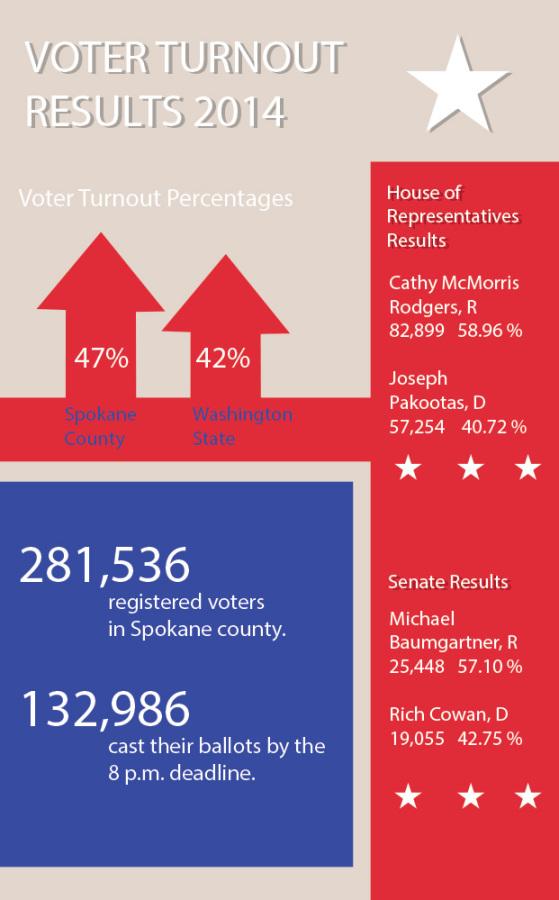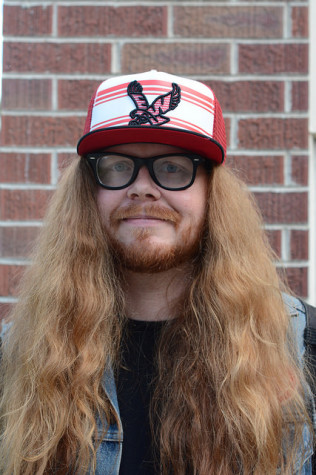Low turnout for Spokane County in midterm elections
November 16, 2014
The day before the Nov. 4 general elections in Washington state, local media in Spokane predicted low voter turnout.
KXLY, KHQ and The Spokesman-Review all predicted this phenomenon, which is common in mid-term elections nationwide. The Spokane County Elections website reported that, of the 281,536 registered voters in the county, only 132,986 cast their ballots by the 8:00 p.m. deadline.
At just over 47 percent, the turnout for Spokane County was actually higher than the just over 42 percent turnout reported by the Washington Secretary of State website.
“It’s a nationwide phenomenon; it’s also a local phenomenon,” said Thomas Hawley, Ph.D. associate professor in the department of government at EWU. “Voter turnout in midterm elections is always pretty low. Because there is no president on the ballot, people just tend to not be that into it.”
Hawley said midterm election should be considered just as important as presidential elections. Aside from the many initiatives, propositions and referendums on the ballot, he said all 435 members of the House of Representatives are up for re-election, including at least one representative from the Spokane area.
“I would argue that the initiatives probably have more bearing on our lives as citizens in this state in some cases than do the people who represent us,” said Hawley. The class size initiative [I-1351], for example, would have required an amazing amount of money to be raised, somehow, somewhere, to fund it. And, that comes out of the pockets of ordinary citizens, and so they should, logically, be voting on that.”
According to Hawley, university level students should pay close attention to initiatives like I-1351. Although K-12 education funding levels are protected by the constitution, the funding of higher education is not. He said in the last five or six years tuition has gone up while state investment in higher education has gone down. This means if initiatives like I-1351 pass, EWU students could possibly end up with a part of that bill.
Aside from the technical wording of initiatives on the ballot, and perhaps being uninterested due to the lack of a president on the ballot, EWU students gave a variety of reasons for not voting.
Casey Polmueller, a fifth-year student at Eastern, said she wanted to vote but lost her ballot. Senior Colton Nowak said he feels that with the high numbers of voters, his vote does not count.
Matthew Shelly, EWU senior and U.S. Coast Guard veteran said he used to share this feeling of disillusionment in the voting process. He said, however, after leaving the military, he became more engaged in the political process and votes now because he feels his vote really does count.
“Before I was in the military, I didn’t have any kind of attachment to the political process,” said Shelley. “I was young. I joined when I was 22. I pretty much felt ostracized and even alienated from it. It felt like my voice didn’t really matter. After departing the military, you tend to take sort of an ownership of the action itself; you [start] to feel like you do have a voice, a direct effect.”
Hawley said he agrees that a sense of disillusionment, disempowerment and alienation from the system are seen as reasons not to vote, especially with the recent decision of the Supreme Court to allow corporations to be seen as people, and subsequently their big money donations to be seen as free speech, leaving average citizens with the feeling of being “outspent.”
Shelley said he, like many young people, felt that politics was like a big mysterious machine, so he avoided it. Now age 35, married with a child, he said he has had the time to think critically and be more involved in the process.
“I feel like if you haven’t voted, then you can’t complain,” said Shelley. “And I like to complain.”









